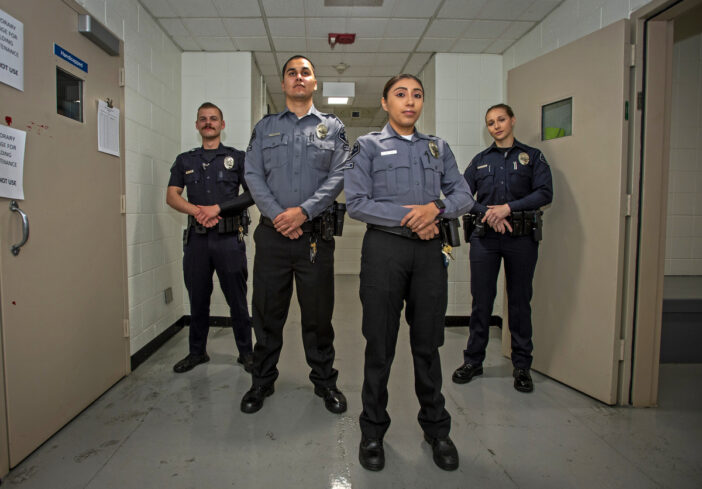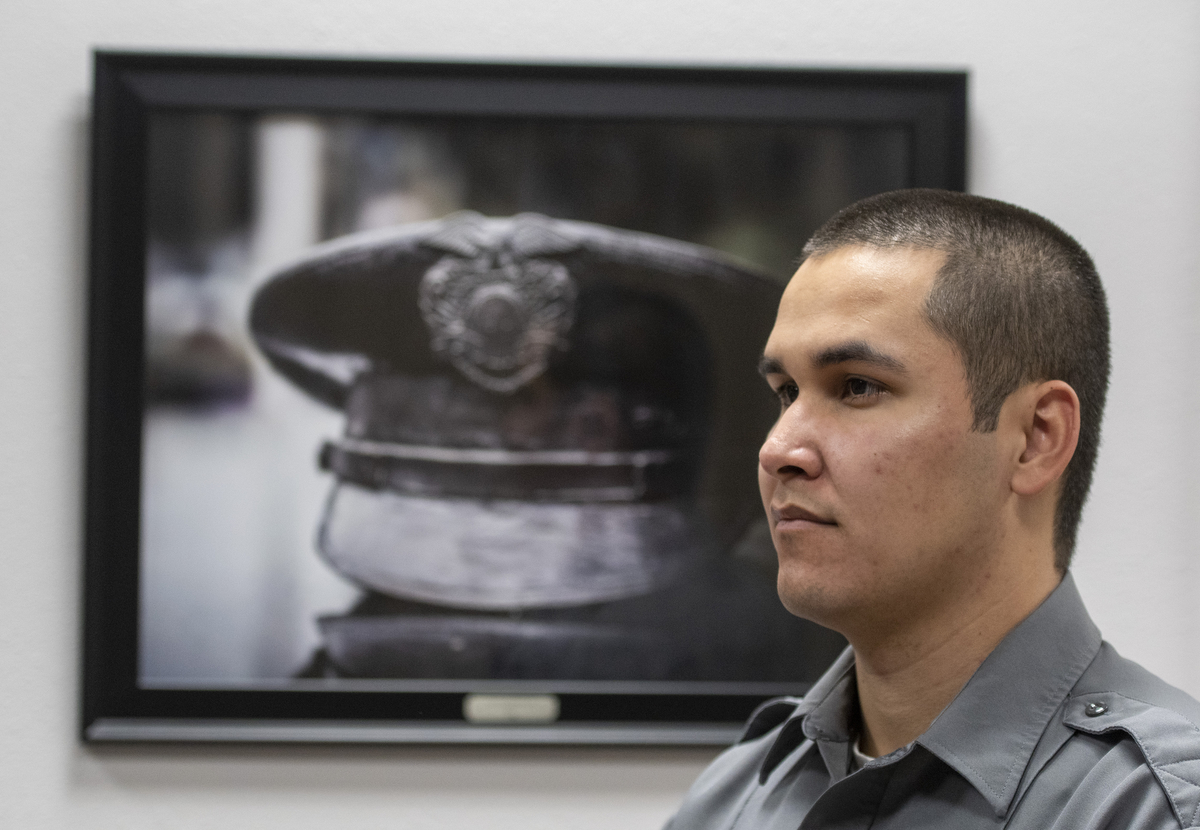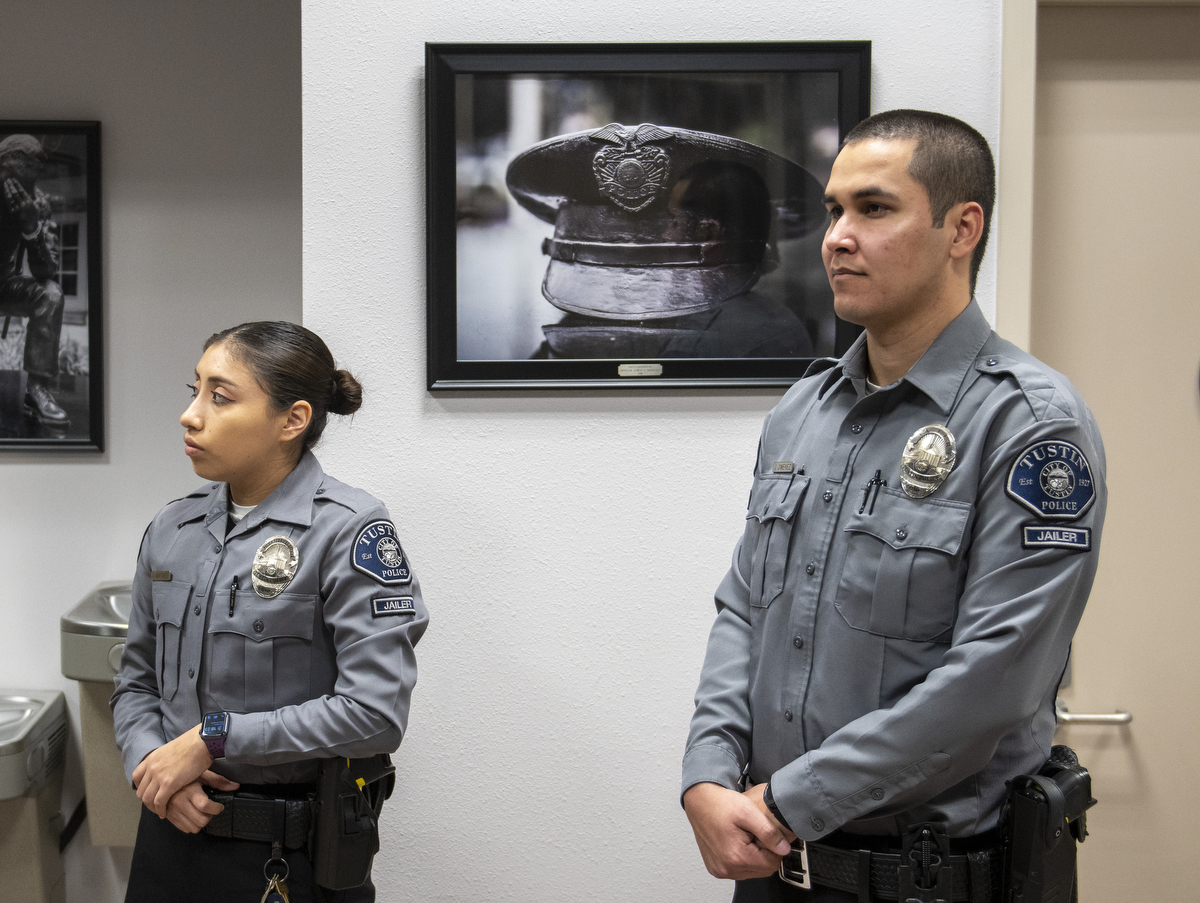Nathalie Martinez says she’s just “going up the ladder.”
Jacob Jimenez said he is gaining life experience.
Ian Garibay said he is being given the opportunity to help people, which is all he’s ever wanted.
All three are testing the waters of law enforcement by joining the Tustin Police Department’s part-time detention program, which can create an opportunity to become a police officer through a new program launched in 2019.
“We use it as a farm system. So far it’s been good,” said Sgt. Robert Nelson, who oversees the program.
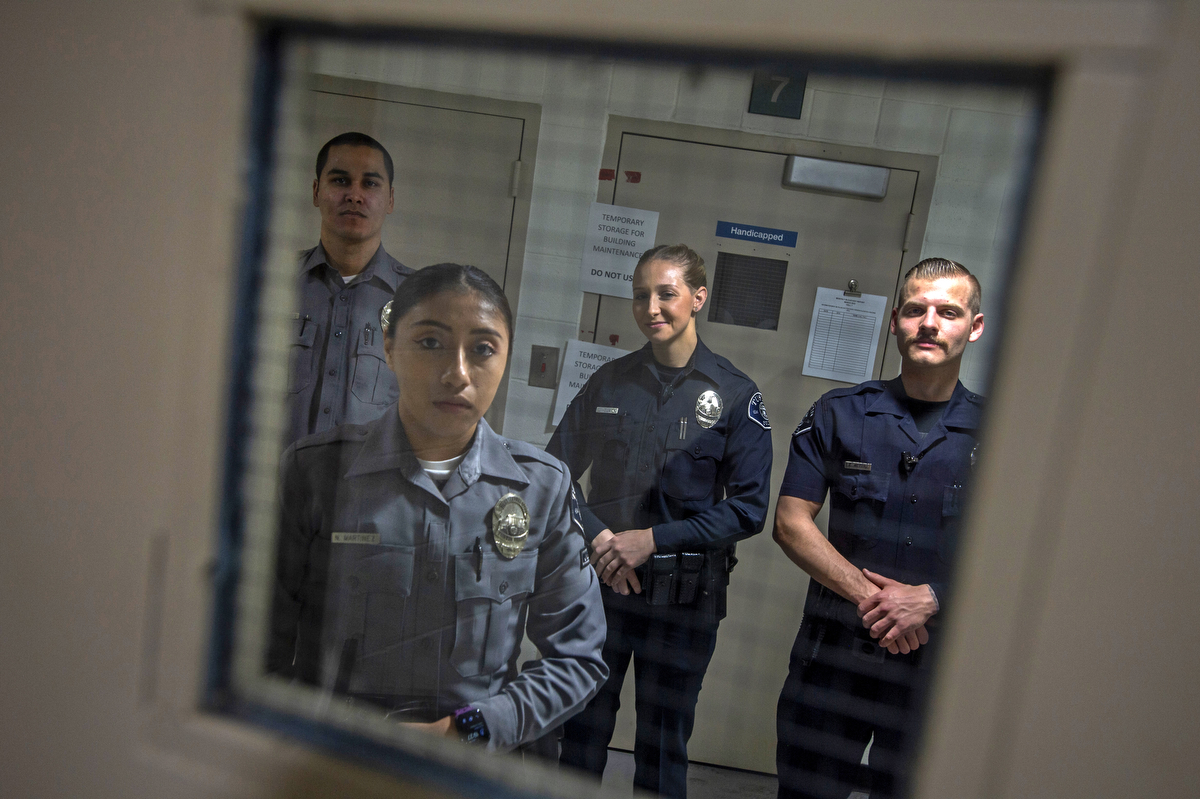
Tustin Detention Officer Jacob Jimenez, Detention Officer Nathalie Martinez, Tustin Police Officer Jessica Helmick and Tustin Police Officer Kyle Meyer stand in the holding area of the Tustin Police Department.
Photo by Mike Goulding / for Behind the Badge
Two former detention officers have joined the Tustin Police Department as officers, and another (Jesus Pasaye) is being sponsored in the police academy. Kyle Meyer was the first to complete the process and Jessica Helmick later joined him. Sergio Mendoza joined the Orange County Sheriff’s Department.
Although the department is three-for-three in promoting detention officers to law enforcement, detention officers are not required to apply for the police academy or continue in law enforcement. Like Explorers or cadets, detention officers learn whether they really want to go into policing as a career. And, like cadets, they are paid.
“They get to see the bad guys,” Nelson said. “I think it’s a good start.”
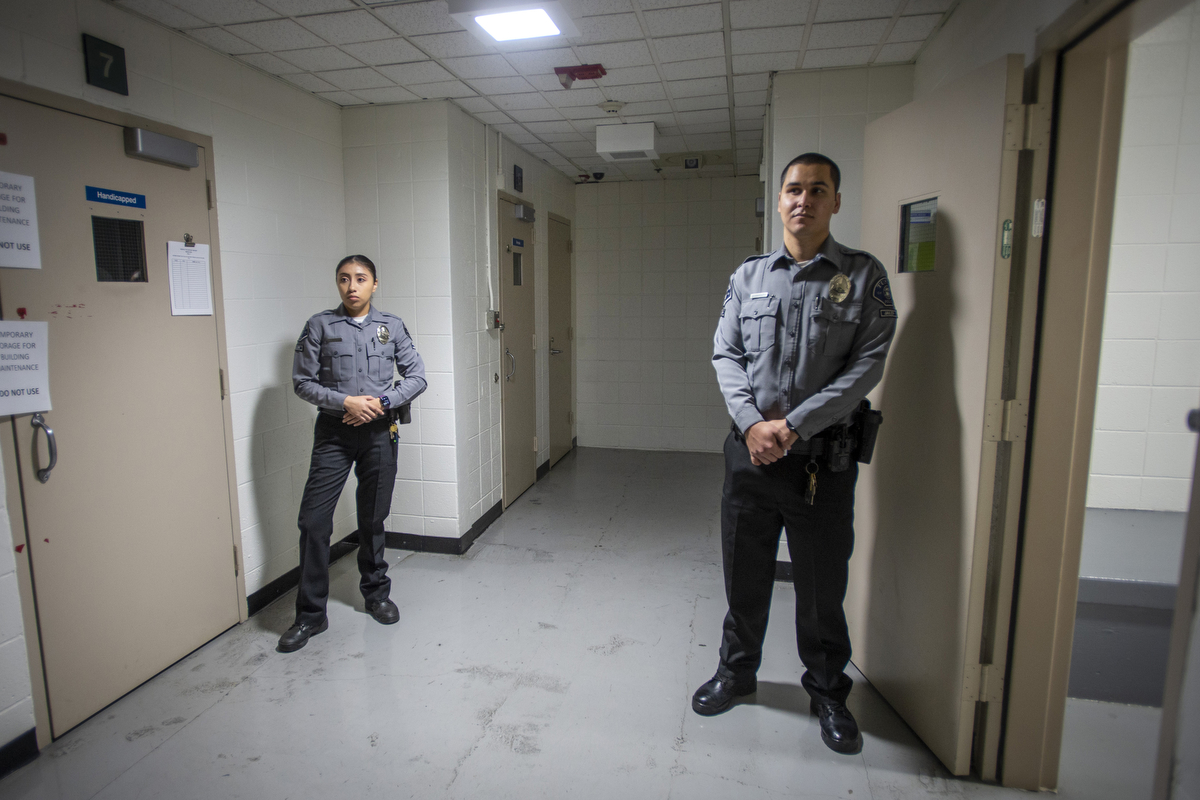
Tustin Detention Officer Nathalie Martinez and Tustin Detention Officer Jacob Jimenez stand in the holding area of the Tustin Police Department in March 2023.
Photo by Mike Goulding / for Behind the Badge
There is no timetable for how long detention officers serve. Several have worked the jobs around their academic careers, while others work on the job until an academy opening is available and offered. The hope is to create one or more full-time positions.
Although the three current detention officers are focused on furthering their careers, they are happy they don’t have to dive headfirst into the academy.
“I wanted to ease my way into it,” said Martinez, who has also been an Explorer and cadet and is majoring in psychology at Irvine Valley College.
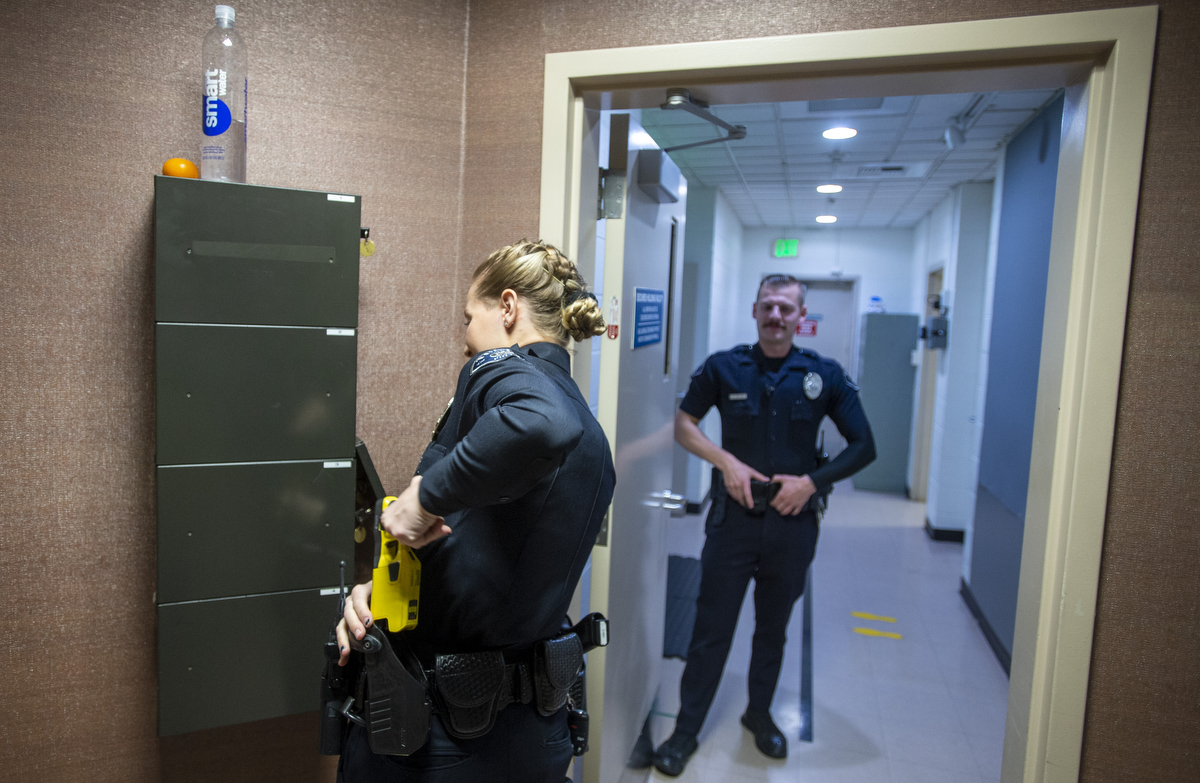
Tustin Police Officer Jessica Helmick checks her weapon before entering the holding area of the Tustin Police Department.
Photo by Mike Goulding / for Behind the Badge
Likewise, Jimenez wanted to test the waters of law enforcement before fully committing.
“I don’t have a lot of life experience,” Jimenez said. “I want to learn how to handle people rather than just jump in. It’s kind of like a foot in the door.”
If the detention officers perform their jobs well and want to become a sworn officer, they gain a preferred position among Tustin candidates for the police academy.
Martinez and Jimenez say their experiences so far have deepened their resolve to become police officers.
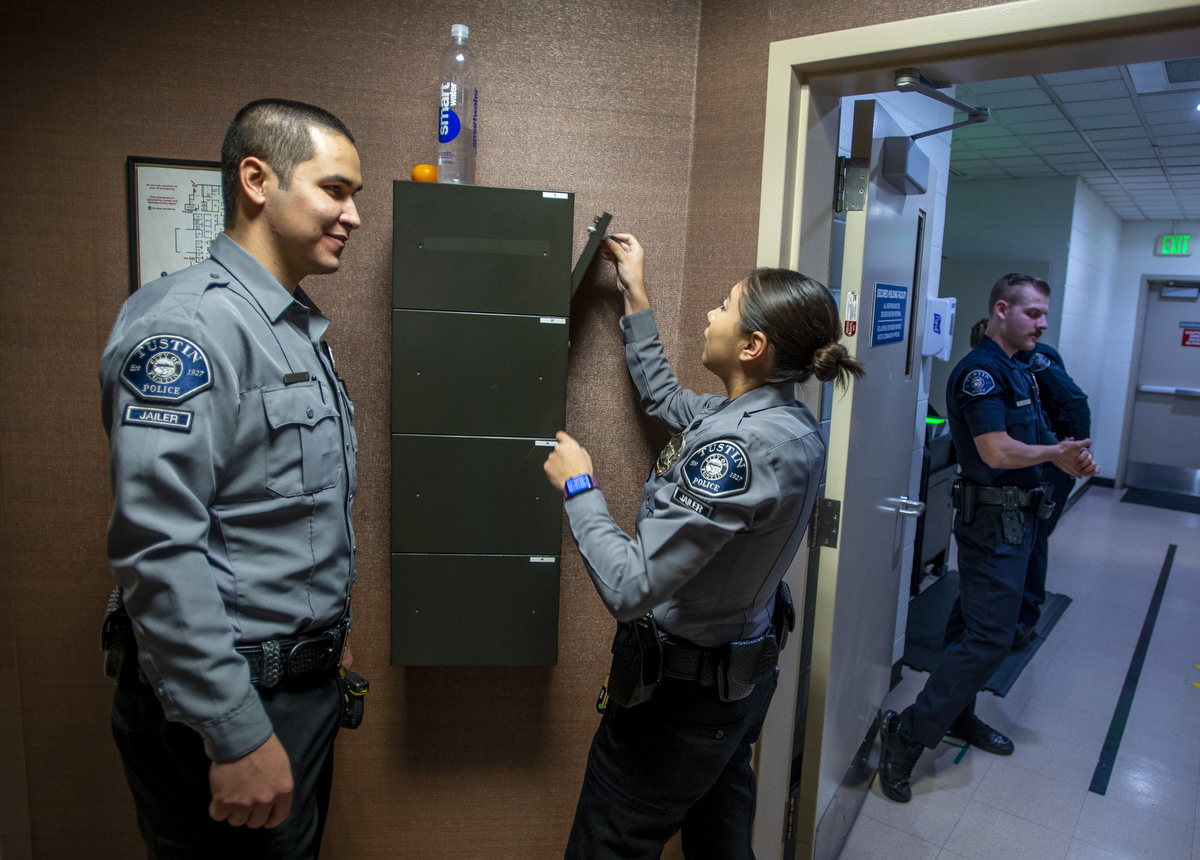
Tustin Detention Officer Jacob Jimenez waits while Detention Officer Nathalie Martinez checks her weapon before entering the holding area of the Tustin Police Department.
Photo by Mike Goulding / for Behind the Badge
Role models
Meyer and Helmick, who are now patrol officers, are prime examples of the program’s benefits. Both went into the jailer program with clear visions of what they wanted. For Meyer, police work was the family business. His dad is a helicopter pilot for Anaheim Police Department and all his uncles are police officers.
“It intrigued me being surrounded by officers,” Meyer said. “I knew it was the path I wanted to take.” During his childhood, he says, “In the backyard we’d play cops and robbers. I was always the sheriff.”
Meyer’s mother guided him toward Tustin. Meyer took a ride-along in 2018 and was hooked. In 2019 he applied to become a detention officer and was on his way.
“It opened my eyes a little more,” he said of his tenure as a jailer.
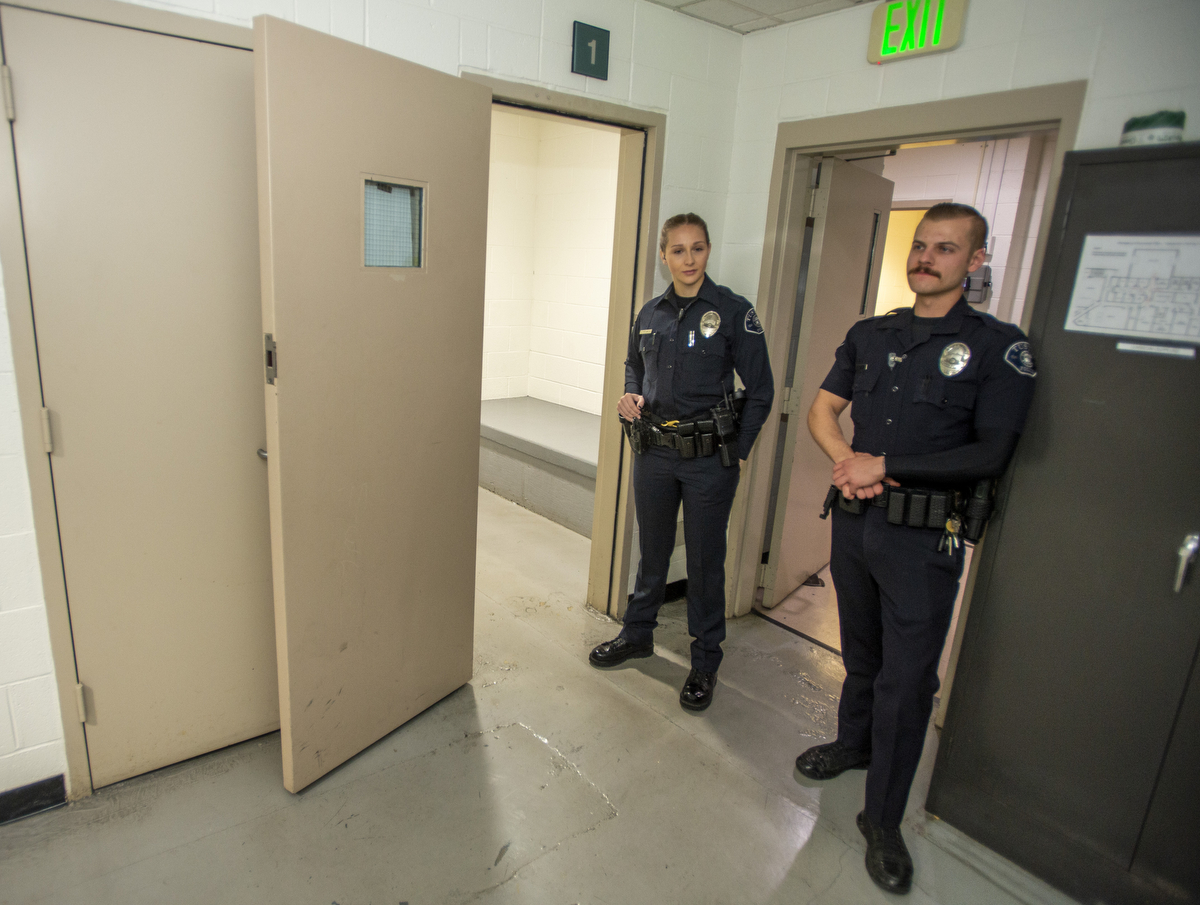
Tustin Police Officer Jessica Helmick and Tustin Police Officer Kyle Meyer, stand in the holding area at the Tustin Police Department in March 2023.
Photo by Mike Goulding / for Behind the Badge
Similarly, both of Helmick’s parents worked at the Anaheim Police Department. She knew from a young age that she wanted to be a police officer. Helmick said being a detention officer deepened her interest in being an officer, and specifically in being a Tustin officer.
“Once I started, I knew I wanted to work at this department,” she said.
When she told friends at Anaheim PD that she was entering the academy as a Tustin recruit, they understood.
“They said, ‘Go for it, but you better come back,’” she said with a grin.
Will she go back?
“No, I’m not,” she said, still smiling.
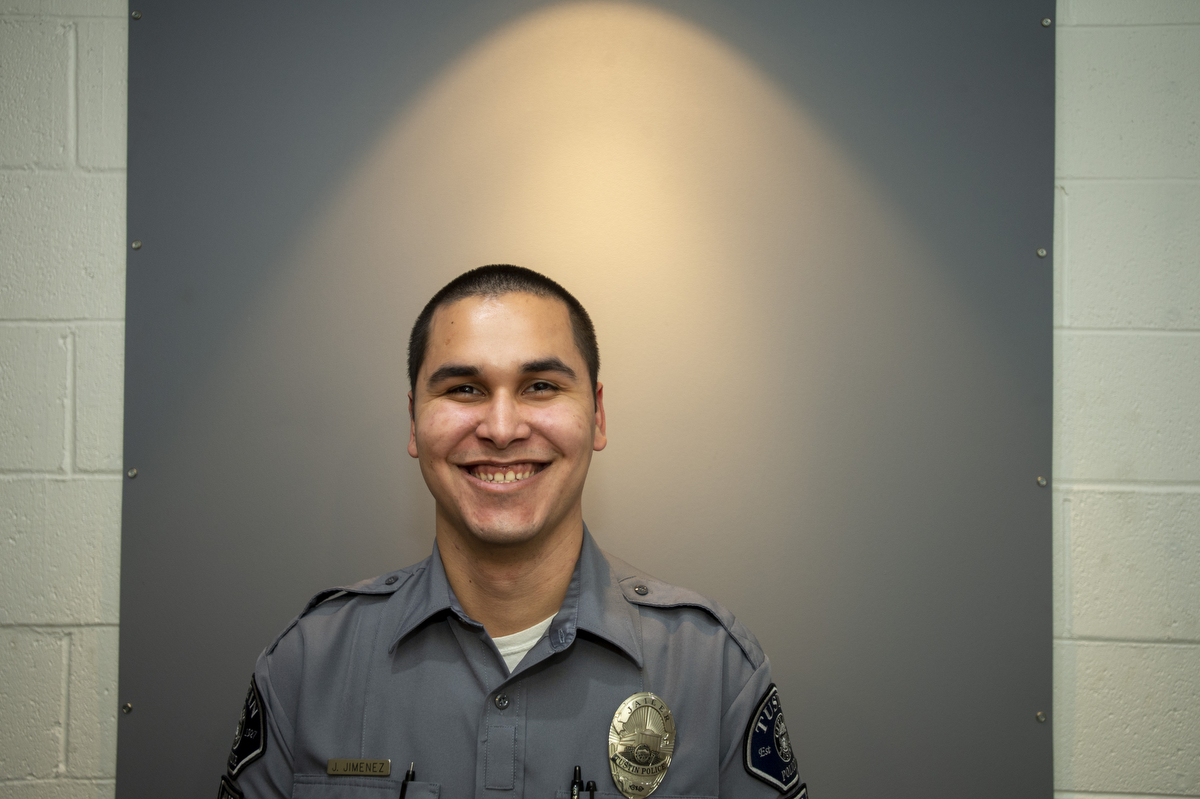
Tustin Detention Officer Jacob Jimenez at the Tustin Police Department.
Photo by Mike Goulding / for Behind the Badge
“The thing with Tustin is I felt a sense of loyalty. I had made good relationships,” she said. “They said, ‘So long as you pass everything, we’ll put you in the first academy (opening).’ ”
Nelson said Meyer and Helmick are great examples of the program’s success.
“They’re both very promising young officers,” Nelson said. “It’s great to see them thrive.”
A learning curve
Detention officers are paired with a field training officer to learn about searching and taking suspects into custody in the field, processing and either citing and releasing them, or booking and transporting them to Orange County jail. The detention officers are armed and trained with Tasers. When work at the jail is slow, they work in a variety of traffic operations. In the meantime, they learn valuable lessons about being in law enforcement.
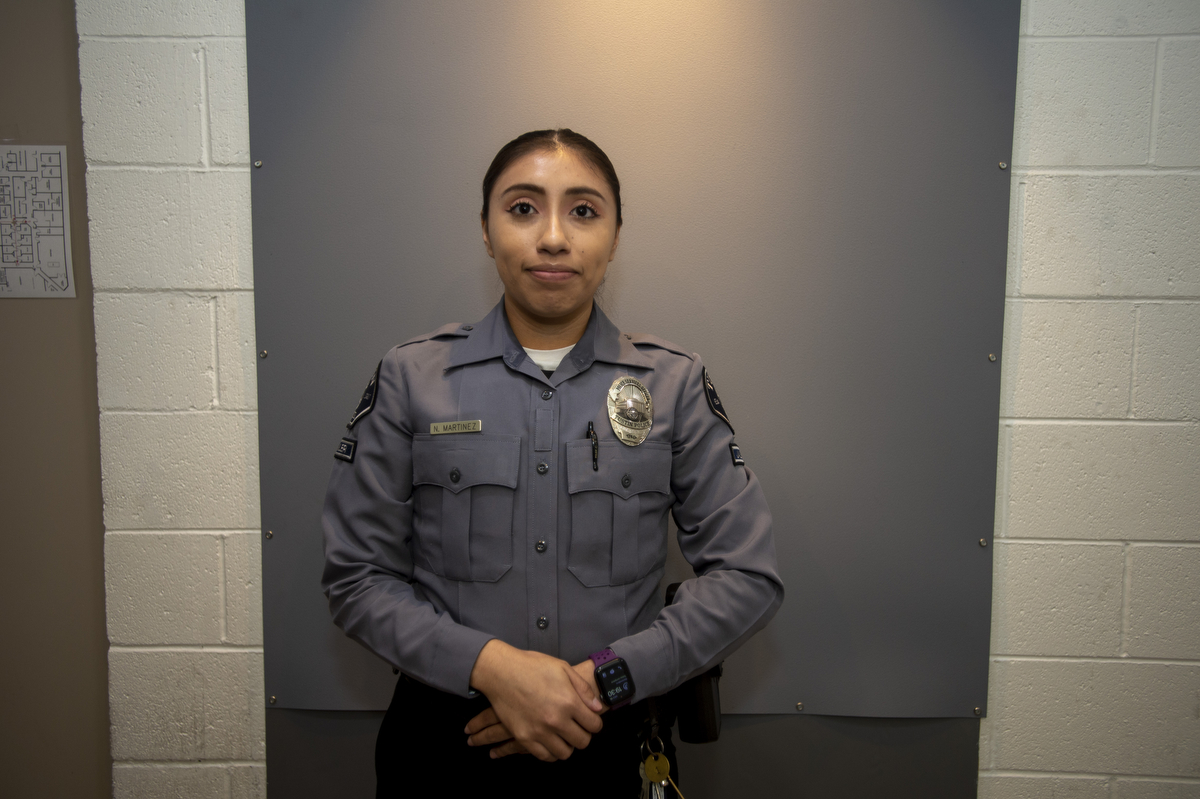
Tustin Detention Officer Nathalie Martinez at the Tustin Police Department.
Photo by Mike Goulding / for Behind the Badge
For Martinez, as a smaller female, learning to communicate, assert, and handle herself have been invaluable.
“I have to put hard work in,” she said. “Males are more aggressive to us.”
Helmick can relate. She first faced aggression and those who “push buttons” as a jailer and remembers well the first time she had to use force in the jail. She still faces the unique challenges of being a female officer on the streets, but her real-life jailer experiences prepared her in ways she couldn’t learn in class.
“You have to demand respect…It’s a hard line to walk,” she added, “especially being a female. It can get difficult.”
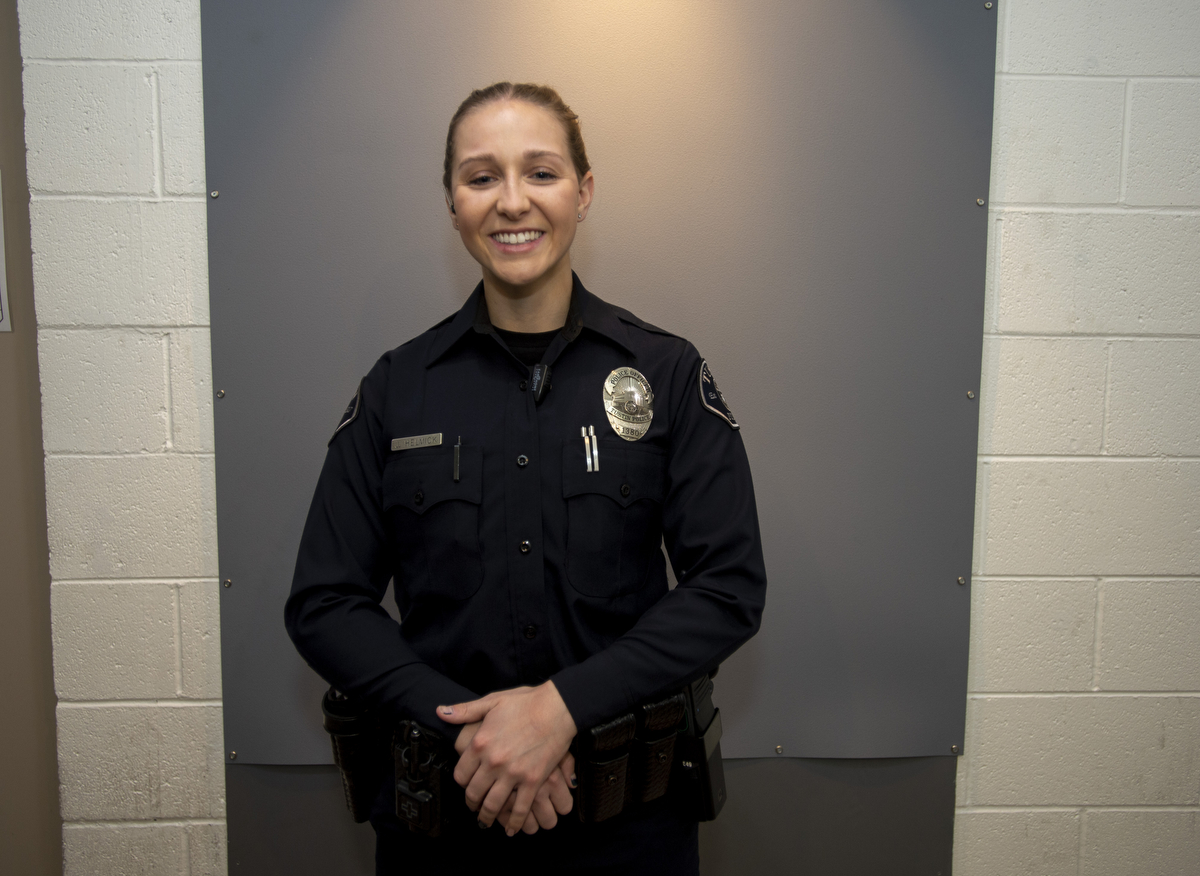
Tustin Police Officer Jessica Helmick at the Tustin Police Department.
Photo by Mike Goulding / for Behind the Badge
Garibay said he has learned how to communicate in a positive way with prisoners, cultivate relationships, and maybe even, “help them see the light.”
For Jimenez, one of the difficult aspects of the job was learning all the codes and language of police work. The knowledge he gains now will pay dividends, and save him some push-ups, in the police academy, where recruits are regularly drilled on police codes and language.
“They’re always trying to trip you up,” Helmick said of academy instructors.
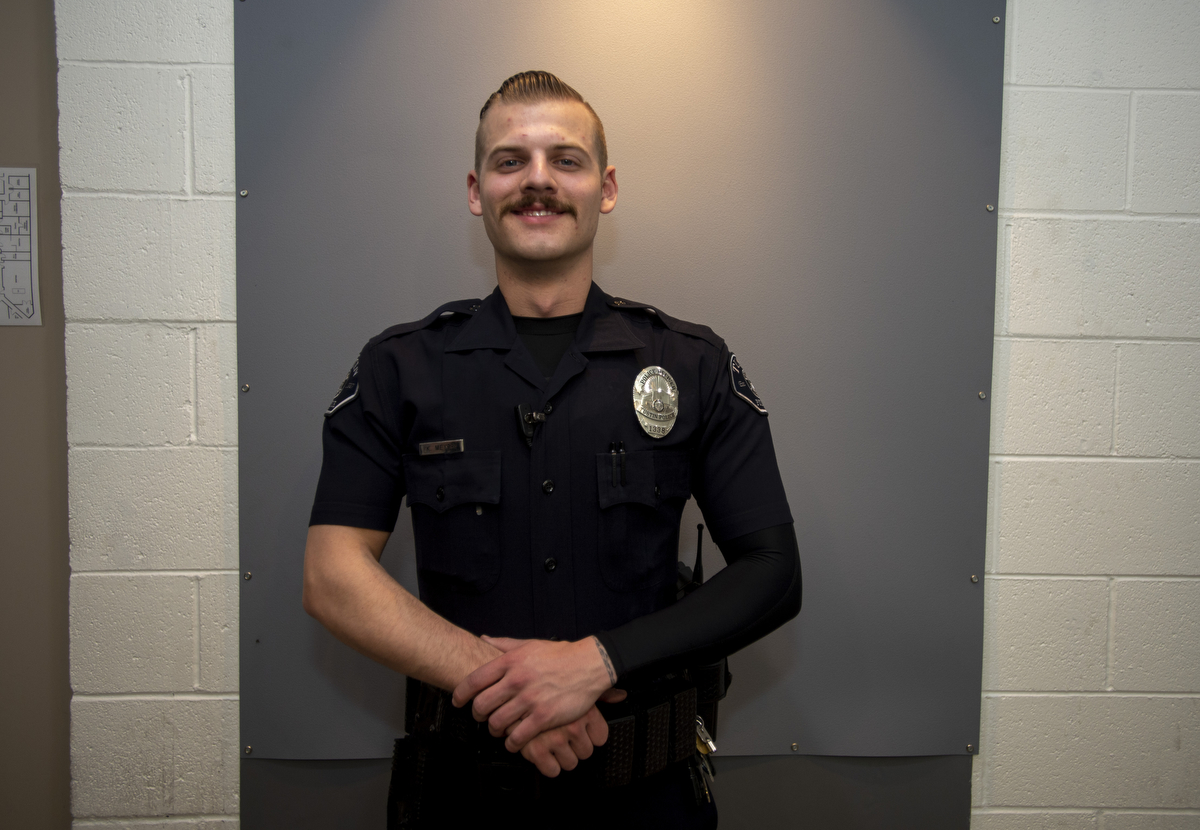
Tustin Police Officer Kyle Meyer at the Tustin Police Department.
Photo by Mike Goulding / for Behind the Badge
Invaluable to officers
Detention officers take on the hours-long process of booking and/or citing and transporting inmates, all of which were previously done by officers. While some cities outsource detention work to private companies, Nelson said he prefers this system.
“They work for the City, so they have the City of Tustin standards,” Nelson said. “It allows Tustin PD to have ownership, and officers are accountable to Tustin PD.”
Meanwhile, Nelson said, police officers are freed to engage in proactive police work.
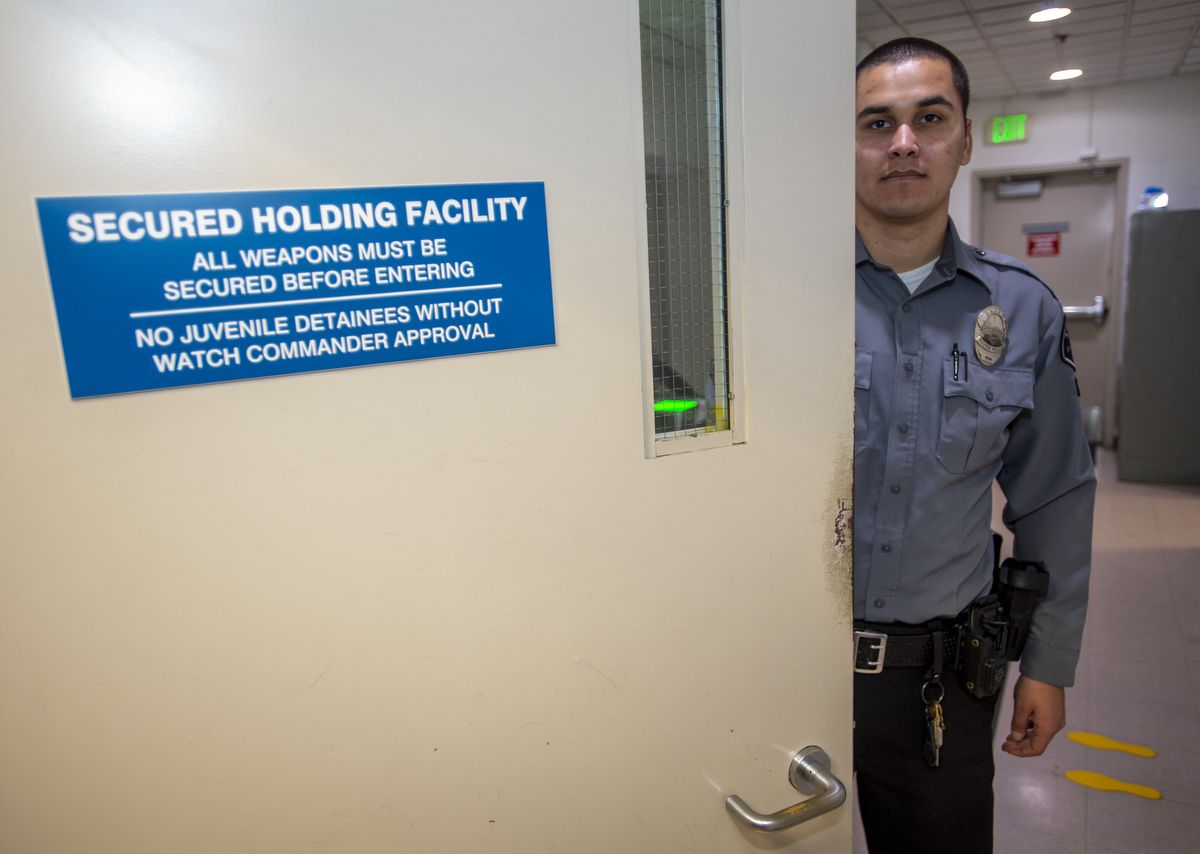
Tustin Detention Officer Jacob Jimenez at the Tustin Police Department.
Photo by Mike Goulding / for Behind the Badge
“Not having to be out of service for five hours is huge,” Helmick said.
Helmick vividly remembers the first day after her probationary period. As she prepared for her first solo shift, she sat in the car for a moment to gather herself and take it all in.
“I thought ‘Oh, my God, I finally did it,’” she recalls.
 Behind the Badge
Behind the Badge
